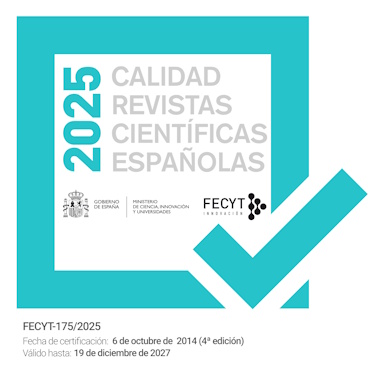Archives
-
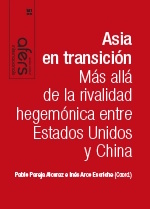
LAST ISSUE # 141. "Asia in transition: beyond the hegemonic rivalry between the United States and China"
Revista CIDOB d'Afers Internacionals, nº. 141 Quadrimestral (October-December 2025) ISSN:1133-6595 | E-ISSN:2013-035X DOI: https://doi.org/10.24241/rcai.2025.141.3 Scientific coordination: Pablo Pareja Alcaraz (Universitat Pompeu Fabra) and Inés Arco Escriche (CIDOB)Asia is immersed in a process of transition and reassessment of regional imaginaries where geopolitical borders, and the inclusion or exclusion of actors and relations, are shifting. Yet a tendency persists in analysis to focus primarily on the hegemonic rivalry between China and the United States as the only structural factor, overlooking the capacity for agency of the rest of the actors in the region. Issue 141 of Revista CIDOB d’Afers Internacionals examines how different Asian actors adapt to the competition dynamics between China and the United States, paying particular attention to the rise of new strategies of diversification, flexibility and alignment, and their impact on multilateral cooperation and regional order. To this end, it focuses on case studies on ASEAN, Japan, South Korea, Taiwan and the Philippines, which reveal the complexity of responses, factors and initiatives influencing the national, regional and global transformation underway.
>> The full text articles of this issue are available only in Spanish language
-

Nº. 140. The politicisation of immigration: a comparative perspective in Europe and its neighbourhood
Revista CIDOB d'Afers Internacionals, nº. 140
Cuatrimestral (mayo-septiembre 2025)
ISSN:1133-6595 | E-ISSN:2013-035X
DOI: https://doi.org/10.24241/rcai.2025.140.2
Scientific Coordination: Blanca Garcés, Senior Research Fellow, CIDOBThe politicisation of immigration –which both fuels and is fuelled by the rise of the extreme right– polarises political debate, creates confusion in the realm of public policy, stirs conflict at the local level and, ultimately, jeopardizes the functioning of our democracies. This issue analyses the causes and consequences of the politicisation of immigration, that is, why immigration has become such a central issue and what implications it carries. To this end, it goes beyond explanations that focus exclusively on the extreme right, as we understand that, although it is a key actor, it is not the only one. The comparison of the cases of Spain, Italy, the Netherlands, the United Kingdom, Turkey, and Tunisia helps us discern how different political, socio-economic, and cultural contexts can lead to different forms of politicisation.
Keywords: politicisation, immigration, extreme right, narratives, Europe, Turkey, Tunisia
>> The full text articles of this issue are available only in Spanish language
-
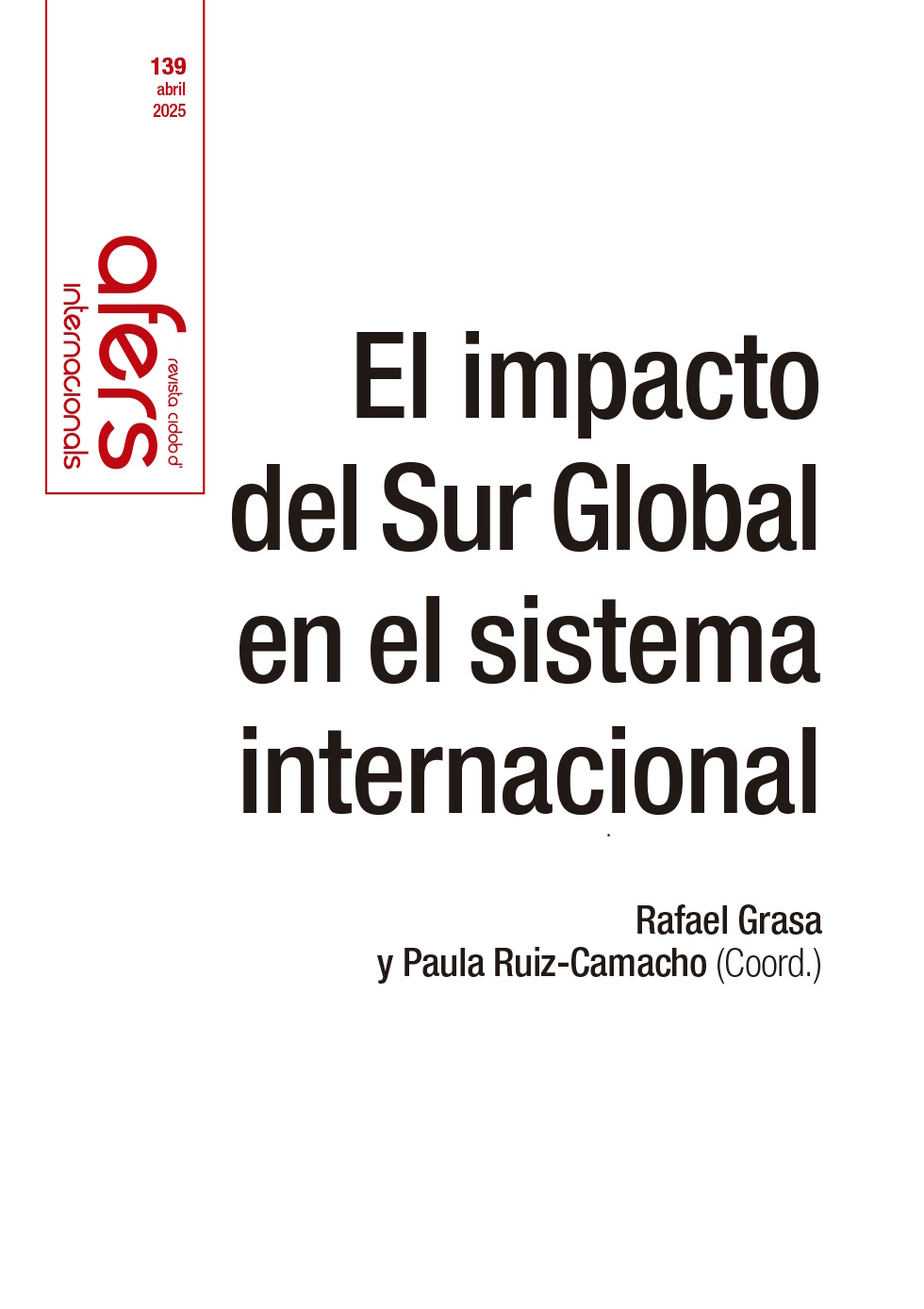
Nº. 139. The impact of the Global South on the international system
Revista CIDOB d'Afers Internacionals, nº. 139
Quadrimestral (January- April 2025)
ISSN:1133-6595 | E-ISSN:2013-035X
DOI: https://doi.org/10.24241/rcai.2025.139.1"The impact of the Global South on the international system"
Scientific Coordination: Rafael Grasa Hernández (UAB- CIDOB), Paula Ruiz-Camacho (Universidad Externado de Colombia).
Coinciding with the 70th anniversary of the Bandung Conference, Issue 139 of Revista CIDOB d’Afers Internationals looks in depth at the Global South’s growing impact on the international system. It does so in an environment marked by profound transformations in the orders that emerged in the aftermath of the two world wars and the end of the Cold War: fragmentation of the liberal order, loss of the West’s centrality and the emergence of new power dynamics. Nine contributions examine how different Global South actors are having an impact on global norms, institutions and agendas. The monograph concludes that, far from being a homogenous bloc, the Global South represents a diverse, growing and highly significant force in the international system. The group of countries that form the Global South exercises increasing agency and is challenging the dominant frameworks of international relations with a call for fresh, more inclusive and less Western-centric narratives to understand the changes underway.
We dedicate this issue, which coincides with the 70th anniversary of the Bandung Conference, to the legacy and memory of Josep Ribera –Pep–, founder of CIDOB and this publication, and a tireless advocate of the Third World. On a personal note, Rafael Grasa, co-scientific coordinator of this special issue, attributes much of his commitment to the Global South and the struggle for development to Pep’s guidance and inspiration.
>> The full text articles of this issue are available only in Spanish language
-
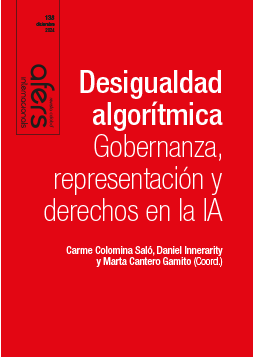
Núm. 138. Algorithmic inequality: governance, representation and rights in AI
Revista CIDOB d'Afers Internacionals, nº 138
Quadrimestral (October-December 2024)
ISSN:1133-6595 | E-ISSN:2013-035X
DOI: https://doi.org/10.24241/rcai.2024.138.3"Algorithmic inequality: governance, representation and rights in AI"
Scientific coordination: Daniel Innerarity, Carme Colomina Saló and Marta Cantero Gamito
Artificial intelligence (AI) and the breakneck pace at which it is evolving present a technological, economic, social and geopolitical challenge that the major global powers are approaching from different, sometimes conflicting, strategic perspectives. We are witnessing a process of algorithmic colonisation of the public sphere and decision-making, in which democracy and AI impact each other in multiple ways.
Against this backdrop, issue 138 of Revista d' Afers Internacionals seeks to contribute to the public debate on the challenges involved in achieving a democratic AI. Drawing on specific cases, it reflects on algorithmic governance and the risks involved in an AI without guardrails. It aims to bring an original, complex and heterogeneous view to the debate on how and why we urgently need to democratise AI.
Editorial project co-funded by the European Union (EU). The opinions expressed in the articles are the sole responsibility of the authors and do not necessarily reflect the views of the EU or the European Education and Culture Executive Agency (EACEA).
>> The full text articles of this issue are available only in Spanish language
-
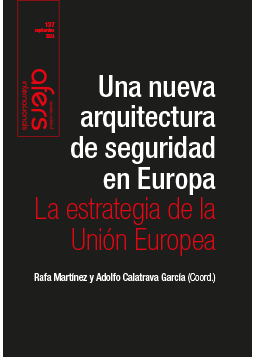
Núm. 137. A new security architecture in Europe: the strategy of the European Union
Revista CIDOB d’Afers Internacionals, nº 137
Quadrimestral (May-September 2024)
ISSN:1133-6595 | E-ISSN:2013-035X
DOI: https://doi.org/10.24241/rcai.2024.137.2"A new security architecture in Europe: the strategy of the European Union"
Scientific coordination: Rafa Martínez and Adolfo Calatrava García
This issue is dedicated to our dear colleague Adolfo Calatrava, who passed away unexpectedly while we were finishing the editorial process of this monograph. His generosity and rigor will remain as his legacy. Rest in peace.
In the framework of the process of construction of European Union (EU) security and defence, and following the Russian invasion of Ukraine, Issue 137 of Revista CIDOB d’Afers Internacionals looks at how the current moment of change is impacting the continent’s institutional security architecture, as well as the distribution of power and the role its leading actors might play. It examines the institutional, social and political party obstacles that hamper the creation of a European army; the supposed benefits of the European Political Community; the EU potentially casting off its role as a small power; the political culture of defence among Europeans; and the impacts of the European defence industry on the bloc’s economic globalisation, paying particular attention to the Defence Technological and Industrial Base (DTIB).
With the support of:

-
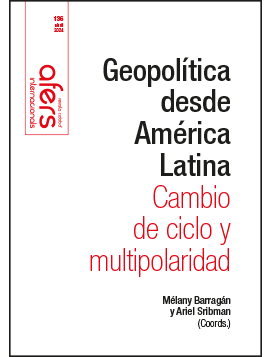
Núm.136. Geopolitics from Latin America: a change of cycle and multipolarity
Revista CIDOB d’Afers Internacionals, nº 136
Quadrimestral (January-April 2024)
ISSN:1133-6595 | E-ISSN:2013-035X
DOI: https://doi.org/10.24241/rcai.2024.136.1"Geopolitics from Latin America: a change of cycle and multipolarity"
Scientific Coordinators: Ariel Sribman Mittelman and Mélany Barragán
The first quarter of the 21st century has seen a dramatic shakeup of the global geopolitical chessboard. US hegemony is being replaced by a multipolarity where other powers – from both the Global North and some from the Global South (the BRICS group, primarily) – are competing, and sometimes collaborating. Given these circumstances, Issue 136 of Revista CIDOB d’Afers Internacionals presents an overview of Latin America’s position in the new scheme of things, and of its relations with certain key actors in this interconnected and interdependent global landscape. To that end, it spotlights the impact of global changes on regional dynamics and the capacity of the various countries of the region to respond to those changes, pointing to the processes underway.
-
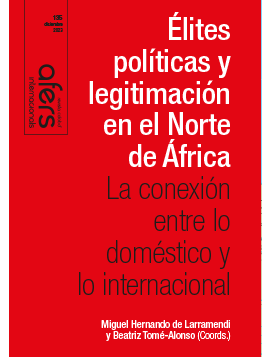
No. 135. Political elites and legitimation in North Africa: the connection between domestic and international spheres
Revista CIDOB d’Afers Internacionals, nº 135
Cuatrimestral (octubre-diciembre 2023)
ISSN:1133-6595 | E-ISSN:2013-035X
DOI: https://doi.org/10.24241/rcai.2023.135.3"Political elites and legitimation in North Africa: the connection between domestic and international spheres"
Scientific Coordinators: Miguel Hernando de Larramendi Martínez and Beatriz Tomé Alonso
The social contract in North Africa is in crisis. What’s more, the region is locked in a socioeconomic crisis that deepened after the COVID-19 pandemic and has been compounded by the global effects of Russia’s invasion of Ukraine. This has highlighted both the vulnerabilities and external dependencies of the states that make up the region in terms of food security and their desire to maintain independent foreign policies in a complex international landscape. It is against this backdrop that the authoritarian and semi-authoritarian elites of these countries feel compelled to revise or reframe their methods of legitimation to remain in power. Consequently, they have expanded their domestic repertoires with ideas, frameworks and/or examples explored in other environments. At the same time, they use internal circumstances to legitimate themselves on the international stage. Issue 135 of Revista CIDOB d’Afers Internacionals presents a theoretical and empirical reflection on the legitimation rationales of these elites, based on the interaction between domestic and international policy, which overlap, interconnect and permeate one another to varying degrees.
-
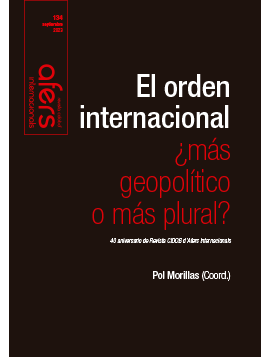
Núm. 134. The international order: more geopolitical or more plural?
Revista CIDOB d’Afers Internacionals, nº 134,
Quadrimestral (May-Setembre 2023)
ISSN:1133-6595 | E-ISSN:2013-035X
DOI: doi.org/10.24241/rcai.2023.133.2.Revista CIDOB d’Afers Internacionals is 40 years old in 2023, coinciding with the 50th anniversary of CIDOB itself. With that in mind, we are publishing this special issue of our journal, entitled “The international order: more geopolitical or more plural?” It offers a close-up view of the current state of the paradigm shift in international relations. The monograph opens with a review of the development of this area of study over the last four decades. It goes on to explore aspects such as the crisis of democracy and of the liberal international order, the geopolitical rivalry between the United States and China, the reshaping of global value chains, the climate agenda, tech diplomacy, and the Asian outlook on the international order, as well as the concept of “planetary politics” and the influence of cities as international actors. In the appendix, an infographic charts the journal’s development over its 40-year history.
-
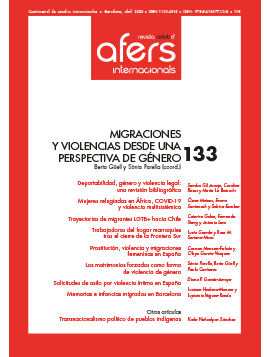
Nº. 133. Migration and violence from a gender perspective
Revista CIDOB d’Afers Internacionals, nº 133
Quadrimestral (January - April 2023)
ISSN:1133-6595 | E-ISSN:2013-035X
DOI: https://doi.org/10.24241/rcai.2023.133.1«Migration and violence from a gender perspective»
Scientific coordinators: Berta Güell y Sònia Parella
In a context of rising global inequality, migrants are often subjected to violence, whether physical, symbolic, institutional or structural. It may take place at any point of the migration cycle – origin, transit or destination. Practices like female genital mutilation, forced marriage, honour killings, rape, coercive prostitution, domestic violence and femicide are specific forms of gender violence that disproportionately affect women and the LGTBI+ community. Given this reality, issue 133 of Revista CIDOB d’Afers Internacionals applies a gender and intersectional perspective to analyse these forms of violence in a range of countries and territories, with the triple aim of contributing to the production of scientific knowledge, stimulating the creation of informed public policies and encouraging critical thinking in order to work towards a society that is free from violence.
-
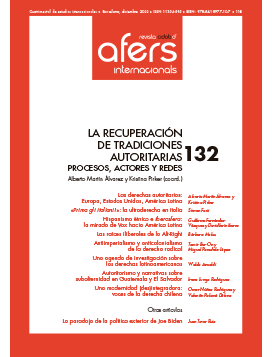
Nº. 132. The recovery of authoritarian traditions: processes, actors and networks
Revista CIDOB d’Afers Internacionals, n.º 132
Cuatrimestral (octubre-diciembre 2022)
ISSN:1133-6595 - E-ISSN:2013-035X
DOI: doi.org/10.24241/rcai.2022.132.3«The recovery of authoritarian traditions: processes, actors and networks»
Alberto Martín Álvarez and Kristina Pirker (coords.)
In Europe, Latin America and the United States the electoral successes and rising popularity of political parties that take nationalist and nativist positions, attack the rights of minorities, women, LGBTQ+ people and migrants, and contest establishment parties and supranational institutions, begs the question of whether a new authoritarian shift or conservative radicalisation is underway at global level with profound political, social and cultural effects. With the aim of contributing new thinking to this debate, issue 132 of Revista CIDOB d’Afers Internacionals gathers texts that seek to reconsider the authoritarian right-wing in the current context. In particular it looks at the revitalisation of conservative practices, discourses and imaginaries in countries on both sides of the Atlantic. Despite the heterogeneity that exists within this ideological universe and the differences between the various local settings, the analyses suggest the presence of both convergences and transfers of ideas, narratives and practices that may be signs of affinities and feelings of belonging that extend beyond national spaces.
-
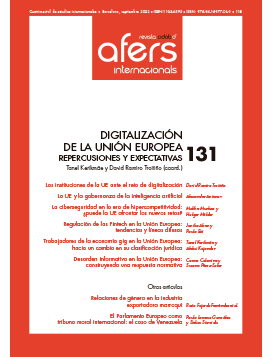
Nº. 131. The digitalisation of the European Union: repercussions and expectations
Revista CIDOB d’Afers Internacionals, n.º 131
Quadrimestral (may-setembre 2022)
ISSN:1133-6595 E-ISSN:2013-035X
DOI: doi.org/10.24241/rcai.2022.131.2«The digitalisation of the European Union: repercussions and expectations»
Tanel Kerikmäe y David Ramiro Troitiño (coords.)
From technology platforms and artificial intelligence to Fintech, cybersecurity, the gig economy and social networks, the digital society is already a fully defined and implemented reality. In this context, the digital development of the European Union (EU) has reached a crucial stage: from a range of perspectives the decisions and regulations adopted on this issue in the near future will significantly affect the whole of the EU, including the lives of its citizens and beyond. Issue 131 of Revista CIDOB d'Afers Internacionals analyses the process of digitalising the EU. Its multidisciplinary approach – taking in the fields of labour, security, information and politics, among others – helps understand the phenomenon, while also contributing to its scientific dissemination and encouraging critical thinking with the aim of achieving a fair, inclusive and competitive digital society.
Algunos artículos del número 131 de Revista CIDOB d’Afers Internacionals forman parte del proyecto de investigación de la Cátedra Jean Monnet «La Europa Digital y su influencia en la integración futura». Número de identificación: 101082988. ERASMUS-JMO-2022-HEI-TCH-RSCH. Programa: ERASMUS2027
-
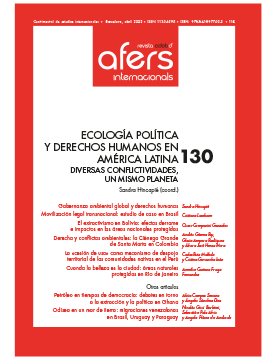
Nº. 130. Political ecology and human rights in Latin America: one planet, various disputes
Revista CIDOB d’Afers Internacionals, n.º 130
Quadrimestral (January-April 2022)
ISSN:1133-6595 E-ISSN:2013-035X
DOI: doi.org/10.24241/rcai.2022.130.1«Political ecology and human rights in Latin America: one planet, various disputes»
Sandra Hincapié (coord.)
At the intersection between sociology, anthropology and law, this article analyses the various legal instruments for the protection of the natural environment in Colombia. In their application, these instruments have produced a range of conflicts, stemming from ecosystem conservation strategies, legal complexity and disregarded social realities. Based on the analysis of the situation in the Ciénaga Grande de Santa Marta, the paper argues that the interaction of the different environmental protection and conservation measures is generating a tension between guaranteeing protection for human rights, people’s well-being and the ecosystems themselves.
-
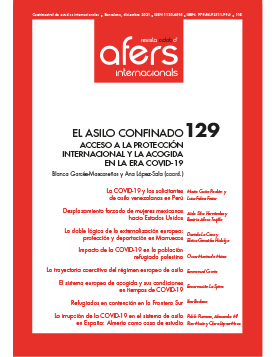
Núm. 129. Asylum in lockdown: Access to international protection and reception in times of COVID-19
Revista CIDOB d’Afers Internacionals, n.º 129
Quadrimestral (October-december 2021)
ISSN:1133-6595 - E-ISSN:2013-035X
DOI: doi.org/10.24241/rcai.2021.129.3"Asylum in lockdown: Access to international protection and reception in times of COVID-19"
Scientific Coordinators: Blanca Garcés Mascareñas and Ana López-Sala
Issue 129 of Revista CIDOB d’Afers Internacionals analyses the impact of the COVID-19 pandemic on international protection from a comparative perspective. Specifically, it has a dual objective: on the one hand to produce academic knowledge on a subject whose recency means it is largely unknown; and on the other to examine the contradictions and implications of asylum in lockdown. It takes particular interest in understanding how the pandemic has catalysed the drift towards tighter restrictions in the global asylum system, with access to the territory, as well as to the process and reception being limited in different parts of Latin America, the Mediterranean and Europe.
-
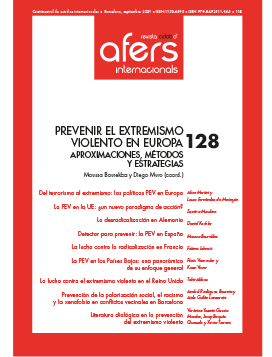
No. 128. Preventing violent extremism in Europe: approaches, methods and strategies
Revista CIDOB d’Afers Internacionals, n.º 128
Quadrimestral (May-September)
ISSN:1133-6595
E-ISSN:2013-035X
DOI: doi.org/10.24241/rcai.2021.128.2"Preventing violent extremism in Europe: approaches, methods and strategies"
Scientific Coordinators: Moussa Bourekba and Diego Muro
In the recent two decades Europe has been faced with three major security challenges: increased home-grown terrorism, the phenomenon of foreign fighters, and the rise of the violent far right. In this situation, several European countries have produced a range of public policies and strategies with the aim of Prevention of Violent Extremism (PVE). Number 128 of Revista CIDOB d’Afers Internacionals (CIDOB Review of International Affairs) seeks to analyse this phenomenon and to formulate some initial answers to the general research question: Is the PVE a mainstay of antiterrorist policies or does it constitute a new paradigm of action against violent extremism?
-
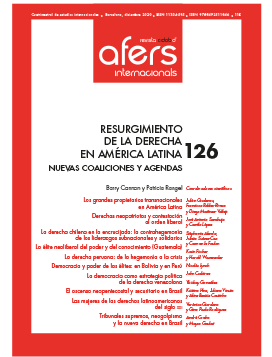
Núm. 126. Resurgimiento de la derecha en América Latina: nuevas coaliciones y agendas
Revista CIDOB d’Afers Internacionals, n.º 126
Quadrimestral (October- December)
ISSN:1133-6595
E-ISSN:2013-035X
DOI: doi.org/10.24241/rcai.2020.126.3"The resurgence of the right in Latin America: new coalitions and agendas"
Scientific Coordinators: Barry Cannon and Patricia Rangel
Latin America has taken a rightward turn. The election of Mauricio Macri as president of Argentina in 2015 and, above all, that of Jair Bolsonaro in Brazil 2018 began an electoral cycle in which Latin America seemed to turn its back on the “pink tide” of left-wing leadership that had dominated the region since the turn of the millennium. Issue 126 of Revista CIDOB d'Afers Internacionals will analyse this phenomenon, taking a comprehensive approach to power that includes its ideological, economic, military and political dimensions, as well as its transnational influences. What is new about the region's current generation of right-wing actors and what is not? The papers paint a broad picture of a regional right wing in transition. Many of the old centres of power remain prominent (such as the army and religion), but their roles and identities are transformed; meanwhile new actors and media are redefining the Latin American right for the 21st century.
>> The full text articles of this issue are available only in Spanish language
-
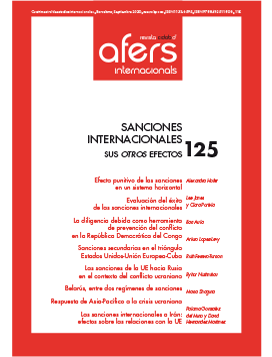
Nº. 125. International sanctions: The “other” effects
Revista CIDOB d’Afers Internacionals, nº 125
Quadrimestral (May-September 2020)
ISSN:1133-6595 | E-ISSN:2013-035X
DOI: doi.org/10.24241/rcai.2020.125.2"International sanctions: The “other” effects"
Scientific Coordinators: Clara Portela and Martijn C. Vlaskamp
Extensive academic research has looked at sanctions from the perspective of those imposing them. Less attention has been given to other impacts, for example, on their targets, on the domestic policies of the sanctioners and on third states. This issue of Revista CIDOB d'Afers Internacionals explores these other effects. A first group of articles examines the reactions of the targets of sanctions, reviews the academic evaluation of their effectiveness and investigates the regulation of "conflict minerals" as a new form of sanction. A second group deals with the effects of sanctions on third countries, in particular the triangles the EU forms with the United States and Cuba on the one hand and with Russia and Belarus on the other, as well as the Asian stance on Western sanctions against Russia and in support of Ukraine. Finally, a third group analyses the impact of EU sanctions against Iran and Russia on some of its member states.
-
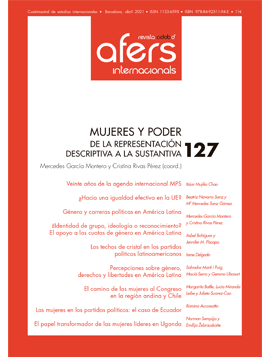
No. 127. Women and power: from descriptive to substantive representation
Revista CIDOB d’Afers Internacionals, n.º 127
Quadrimestral (January-April)
ISSN:1133-6595
E-ISSN:2013-035X
DOI: doi.org/10.24241/rcai.2021.127.1"Women and power: from descriptive to substantive representation"
Scientific Coordinators: Mercedes García Montero and Cristina Rivas Pérez
Great strides have been made over the past few decades in all representative democracies to increase women’s presence in politics and other areas of power. The analysis of women entering these spaces has produced a prolific field of research that considers many aspects, including the obstacles to women’s effective access. This issue of Revista CIDOB d’Afers Internacionals focuses on women’s political representation and presence in areas such as parliaments, governments and international bodies, and examines characteristics, behaviour, attitudes and values. Based on case studies – mainly from Latin America, but also from the international context, Europe and Africa – it seeks to reveal the substantive changes brought about by women entering and influencing spaces of power.
DOI: doi.org/10.24241/rcai.2021.127.1
>> The full text articles of this issue are available only in Spanish language
-
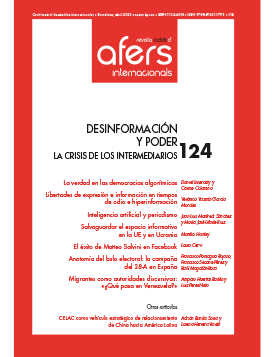
Nº. 124. Disinformation and power: the intermediaries crisis
Revista CIDOB d’Afers Internacionals, nº 124
Quadrimestral (January -April 2020)
ISSN:1133-6595 | E-ISSN:2013-035X
DOI: doi.org/10.24241/rcai.2020.124.1"Disinformation and power: the intermediaries crisis"
Scientific Coordinators: Daniel Innerarity and Carme Colomina
The digital acceleration has transformed the media, narratives, information consumption, and the configuration of public opinion. The rise of social networks and users’ fascination with participation have precipitated the process of disintermediation. We are living through a shift in opinion-making, with multiplying content, sources and stories that are often contradictory or simply false. The internet has put the world within our reach, but it is a world that is skewed by algorithms. In this disinformation society, the debate over ideas has become fragmented and polarised, which has in turn contributed to eroding democracy. Issue 124 of Revista CIDOB d'Afers Internacionals reflects on disinformation and power, freedom of expression and lies, the influence of electoral hoaxes, the communication strategies of populism, the purported new discursive authorities, and the political and legislative changes undertaken in the EU and in Ukraine to combat disinformation.
-
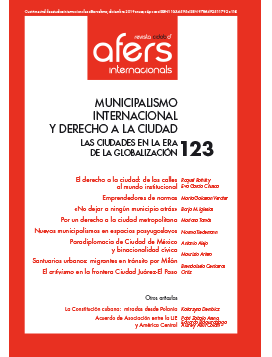
Nº.123. International municipalism and the right to the city: Cities in the age of globalisation
Revista CIDOB d’Afers Internacionals, nº 123
Quadrimestral (October-December 2019)
ISSN:1133-6595 | E-ISSN:2013-035X
DOI: doi.org/10.24241/rcai.2019.123.3Scientific Coordinators: Raquel Rolnik and Eva Garcia Chueca
In the age of globalisation, cities have emerged on the international stage and demand an active role in global governance by using their own messages and sometimes by acting as a counterweight and resistance to national policies or global strategies. Nevertheless, this trend meets obstacles and challenges in increasingly transnational processes that lie even beyond states' sphere of action. One of the narratives recently adopted by international municipalism is the “right to the city”, an expression that grew out of the streets and social movements and that has been penetrating the institutional world and public policies at local and international levels. Its use and impact in this context are a little-explored subject in academic literature. Issue 123 of Revista CIDOB d'Afers Internationals attempts to fill this gap: taking a multidisciplinary and cross-cutting approach, it explores the intersections between the right to the city and international municipalism.
-
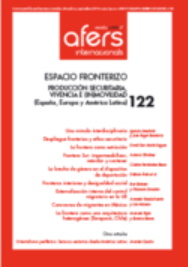
Nº. 122. Borderscapes: Securitarian Production, Experience and (im)mobility (Spain, Europe and Latin America)
Revista CIDOB d’Afers Internacionals, nº 122
Quadrimestral (may-september 2019)
ISSN:1133-6595 | E-ISSN:2013-035X
DOI: doi.org/10.24241/rcai.2019.122.2"Borderscapes: Securitarian Production, Experience and (im)mobility (Spain, Europe and Latin America)"
Scientific Coordinators: Ignacio Mendiola and José Ángel Brandariz
Borders contain and roll-out securitarian logic of control that embodies the potential of state power to produce social stratifications and regulate processes of membership and exclusion. Issue 122 of Revista CIDOB d'Afers Internacionals offers two novel perspectives on the subject: a) certain aspects of the border regime are analysed that have had limited examination in the social sciences field – such as study of the effects of the EU’s so-called internal borders; and b) as bordering is garnering attention in various academic fields the desire is expressed to establish interdisciplinary dialogue about borders and their management regimes. Out of this dialogue, the border is addressed as a space and process that aims to regulate, monitor and condition mobility within a discursive framework that repeatedly reinforces security rhetoric.
>> The full text articles of this issue are available only in Spanish language
-
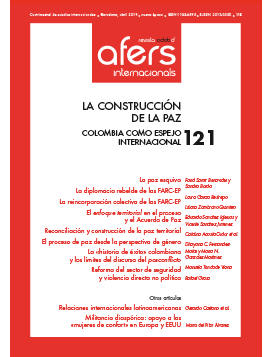
Nº. 121 Peacebuilding: Colombia as an international mirror
Revista CIDOB d’Afers Internacionals, nº 121
Quadrimestral (January-April 2019)
ISSN:1133-6595 | E-ISSN:2013-035X
DOI: doi.org/10.24241/rcai.2019.121.1"Peacebuilding: Colombia as an international mirror"
Scientific Coordinators: Farid Samir Benavides and Sandra Borda
After a long and costly peace process in Colombia, the Revolutionary Armed Forces of Colombia-People's Army (FARC-EP) and the government of Juan Manuel Santos reached a peace agreement in November 2016. But ending the armed conflict with the guerrillas does not mean peace has been achieved, as other groups continue to operate in the country’s interior. Nevertheless, the peace agreement provides a new model for peace negotiations and the construction of the postconflict period. Not only because of its focus on victims’ rights and its model of transitional justice, but because differentiated perspectives were included in the process, especially in ethnic, gender and territorial terms. All these aspects are analysed in the papers that make up issue 121 of Revista CIDOB d’Afers Internacionals, which aims to shed light on the challenges and achievements of this process and peace agreement and to ask if they can serve as a model.
>> The full text articles of this issue are available only in Spanish language
-
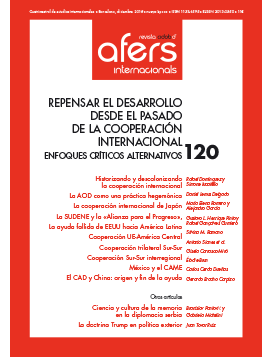
Núm. 120. Repensar el desarrollo desde el pasado de la cooperación internacional: enfoques críticos alternativos
Revista CIDOB d’Afers Internacionals, nº 120
Quadrimestral (October-December 2019)
ISSN:1133-6595 | E-ISSN:2013-035X
DOI: doi.org/10.24241/rcai.2018.120.3"Using past international cooperation to rethink development: alternative critical approaches"
Scientific Coordinators: Rafael Domínguez and Simone Lucatello
As the historical perspective is missing from most publications on Development Studies and International Cooperation, issue 120 of Revista CIDOB d’Afers Internacionals prioritises alternative critical approaches and a historical review of this subject, which has traditionally been addressed using the technocratic orientation of problem-solving and the neoinstitutionalist theory of interdependence. A set of works offering original empirical, comparative and/or theoretical contributions is therefore presented here. Taking a historical perspective they analyse the international regime governed by the OECD's Development Assistance Committee (DAC), cooperation between developing countries (or South-South cooperation), between developing courtiers and the Council for Mutual Economic Assistance, and China’s construction of an alternative international cooperation regime.
>> The full text articles of this issue are available only in Spanish language
-
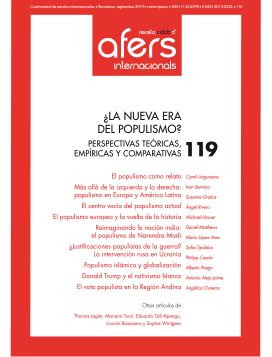
Nº. 119. "The New Era of Populism? Theoretical, Empirical and Comparative Perspectives"
Revista CIDOB d’Afers Internacionals, nº 119
Quadrimestral (Maig-September 2018)
ISSN:1133-6595 | E-ISSN:2013-035X
DOI: doi.org/10.24241/rcai.2018.119.2" The New Era of Populism? Theoretical, Empirical and Comparative Perspectives "
Scientific Coordinators: Camil Ungureanu and Ivan Serrano
-
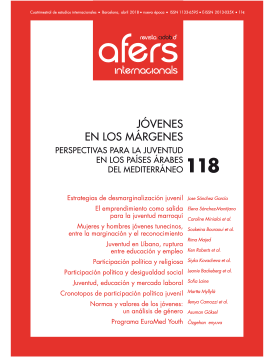
Nº. 118. Youth at the Margins: Prospects for the Youth in the Arab Mediterranean Countries
Revista CIDOB d’Afers Internacionals, nº 118
Quadrimestral (January-April 2018)
ISSN:1133-6595 | E-ISSN:2013-035X
DOI: doi.org/10.24241/rcai.2018.118.1"Youth at the Margins: Prospects for the Youth in the Arab Mediterranean Countries"
Scientific Coordinators: José Sánchez García and Elena Sánchez-Montijano
The 2011 Arab uprisings led to a great proliferation of studies on the situations in the Arab countries of the Mediterranean, with particular attention given to their young people, whose role was particularly central. Seven years on, in-depth exploration is still needed of the conditions in which millions of (mainly young) people demanded change. In this context, issue 118 of Revista CIDOB d’Afers Internacionals uses the analysis of original quantitative and qualitative data to examine the state and diversity of the forms of socioeconomic, political and cultural marginalisation facing the region's young men and women, as well as the strategies and routes of contestation by which they escape them.
-
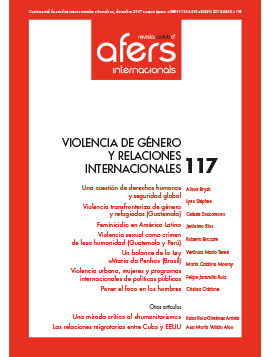
Nº. 117. Gender Violence and International Relations
Revista CIDOB d’Afers Internacionals, nº 117
Quadrimestral (October-December 2017)
ISSN:1133-6595 | E-ISSN:2013-035X
DOI: https://doi.org/10.24241/rcai.2017.117.3"Gender Violence and International Relations"
Scientific Coordinator: Alison Brysk
Violence against women is an issue of human rights and global security. According to the WHO, one in three women worldwide suffers from gender-based violence. Issue 117 of Revista CIDOB d’Afers Internacionals investigates the international roots, responses and patterns of violence against women, especially in Latin America. The papers examine, on the one hand, how the violence is shaped by international conflicts, by international political economy patterns and related social changes; on the other, the role of women’s organisations and feminist movement, and the response of states and international organisations through new legal models and public policies. The authors use a wide range of methodologies, which include ethnography, quantitative analysis, jurisprudence, public policy analysis and comparative case studies.
DOI: doi.org/10.24241/rcai.2017.117.3




